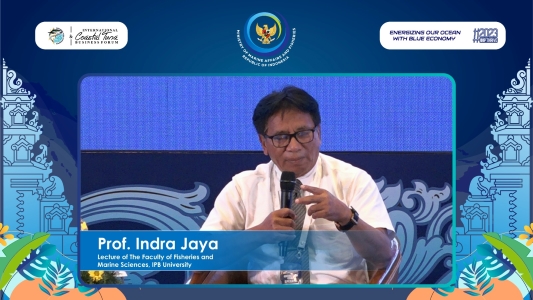As a consequence of being an archipelagic country, Prof Indra Jaya said Indonesia’s tuna fisheries need to be managed with modern fisheries principles.

Gaps in the management of tuna fisheries in Indonesia have become a serious concern for experts and stakeholders in Indonesia. In the forum of The Indonesia Tuna Conference (ITC) and International Coastal Tuna Business Forum (ICTBF), Professor of IPB University from the Faculty of Fisheries and Marine Science (FPIK), Prof Indra Jaya said, tuna fisheries in Indonesia need to be managed with modern fisheries rules.
"The implementation of tuna fisheries management cannot be separated from the influence of Indonesia's location as an archipelago directly bordering the Pacific Ocean and the Indian Ocean," said Prof Indra in the forum organised by the Indonesian Ministry of Maritime Affairs and Fisheries in Bali, recently.
Therefore, according to him, the implementation needs to be carried out by paying attention to how modern fisheries are managed together by referring to international agreements.
"Tuna is a highly migratory fish and goes in and out between national and international jurisdictions (straddling species), so tuna management will refer to the United Nations Convention on the Law of the Sea (UNCLOS) and the United Nations Fish Stock Agreement (UNFSA)," he said.
Prof Indra elaborated, although Indonesia has joined a number of regional tuna management organisations such as the Indian Ocean Tuna Commission (IOTC), the Western Central Pacific Fisheries Commission (WCPFC) and the Commission on the Conservation of Southern Bluefin Tuna (CCSBT), a number of gaps are still found in meeting technical requirements and good management.
Some of the gaps often become the focus of management, including lack of monitoring and supervision, lack of accurate data and information, limited capacity, weak law enforcement and lack of coordination between related parties.
"This situation demands the need for tuna management in Indonesia to be carried out with modern fisheries principles that combine scientific approaches, the latest technology, ecological sustainability and socio-economic welfare in the management of fisheries resources," continued Prof Indra.
He added that Indonesia needs to pay attention to and fulfil technical requirements and good and reliable management capabilities. These technical requirements include fishing gear that can minimise bycatch and reduce its impact on marine ecosystems, such as biodegradable gear materials. The design of vessels that are energy efficient and reduce emissions in the carbon footprint, data collection and reporting, monitoring technology systems and traceability systems are also important technical aspects that need to be considered.
Meanwhile, he continued, Indonesia needs to strengthen management capacity from the institutional aspect, including strengthening capabilities in data collection and analysis as well as human resources (including experts).
"By narrowing the gap between technical requirements and management capacity, it can better ensure the sustainability of the tuna population and at the same time support the economic and social needs of Indonesian fishing communities," Prof Indra explained.
At the end of his presentation entitled 'Narrowing The Gap in Tuna Management:
Technical requirement vs Management Capacity in Indonesia', Prof Indra hoped for a strong commitment from the government, stakeholders and the community to improve monitoring, law enforcement, accurate data collection and effective coordination between all relevant parties.
"Thus, in the future, tuna fisheries management remains sustainable, marine ecosystems are maintained and future generations can still enjoy the abundant marine resources, especially tuna," he said. (RAT/Rz) (IAAS/RUM)



